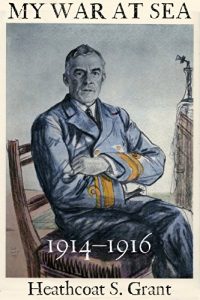This book is based on the wartime recollections of Heathcoat S. Grant, the captain of the HMS Canopus between 1914–1916. It is published in conjunction with the War Letters 1914–1918 series and is based on a series of articles Grant wrote for the Naval Review in the 1920s.
It is published primarily to be of interest to those seeking more details about particular aspects of the war at sea. Grant never intended it to be a great work of naval literature, but a work of historic record.
For the first two years of the war HMS Canopus had as eventful a time as any ship in the Royal Navy, being involved at Coronel, the Battle of the Falklands and the attempt to force the Dardanelles.
As captain of the ship, Grant’s account, based on his service reports and diary, is a valuable source for those wanting to know more about such key naval events of the First World War.
The report of his conversations with Rear-Admiral Sir Christopher Cradock sheds a valuable light on events at Coronel, while his description of the measures taken on land to defend the Falkland Islands details an important aspect of the battle often overlooked in accounts which focus primarily on the battle at sea.
The Canopus also played a critical role at the Dardanelles, getting further up the Straits than any other Allied ship, and Grant’s sceptical perspective from inside the higher echelons of the Royal Navy adds further grist, if more were needed, to critics of the campaign. Later his account of the role of the navy in the Smyrna patrol and the subsequent operations against the Turkish coast following the evacuation of the Gallipoli peninsula provide a fascinating view into this frequently forgotten aspect of the conflict.
With the kind permission of the Naval Review, I have brought together all of Grant’s articles and reproduced them in a single volume to make them more easily accessible. I have also added the account given by Commander Philip J. Stopford of the Canopus which also appeared in the Naval Review. Stopford’s account is much shorter and considerably less interesting than Grant’s, but it does offer some additional insights.
It is published primarily to be of interest to those seeking more details about particular aspects of the war at sea. Grant never intended it to be a great work of naval literature, but a work of historic record.
For the first two years of the war HMS Canopus had as eventful a time as any ship in the Royal Navy, being involved at Coronel, the Battle of the Falklands and the attempt to force the Dardanelles.
As captain of the ship, Grant’s account, based on his service reports and diary, is a valuable source for those wanting to know more about such key naval events of the First World War.
The report of his conversations with Rear-Admiral Sir Christopher Cradock sheds a valuable light on events at Coronel, while his description of the measures taken on land to defend the Falkland Islands details an important aspect of the battle often overlooked in accounts which focus primarily on the battle at sea.
The Canopus also played a critical role at the Dardanelles, getting further up the Straits than any other Allied ship, and Grant’s sceptical perspective from inside the higher echelons of the Royal Navy adds further grist, if more were needed, to critics of the campaign. Later his account of the role of the navy in the Smyrna patrol and the subsequent operations against the Turkish coast following the evacuation of the Gallipoli peninsula provide a fascinating view into this frequently forgotten aspect of the conflict.
With the kind permission of the Naval Review, I have brought together all of Grant’s articles and reproduced them in a single volume to make them more easily accessible. I have also added the account given by Commander Philip J. Stopford of the Canopus which also appeared in the Naval Review. Stopford’s account is much shorter and considerably less interesting than Grant’s, but it does offer some additional insights.






